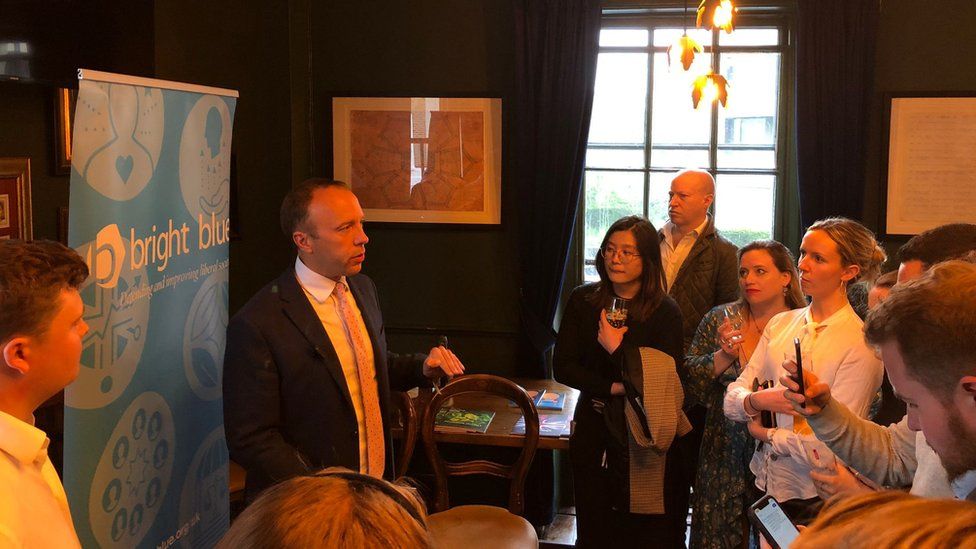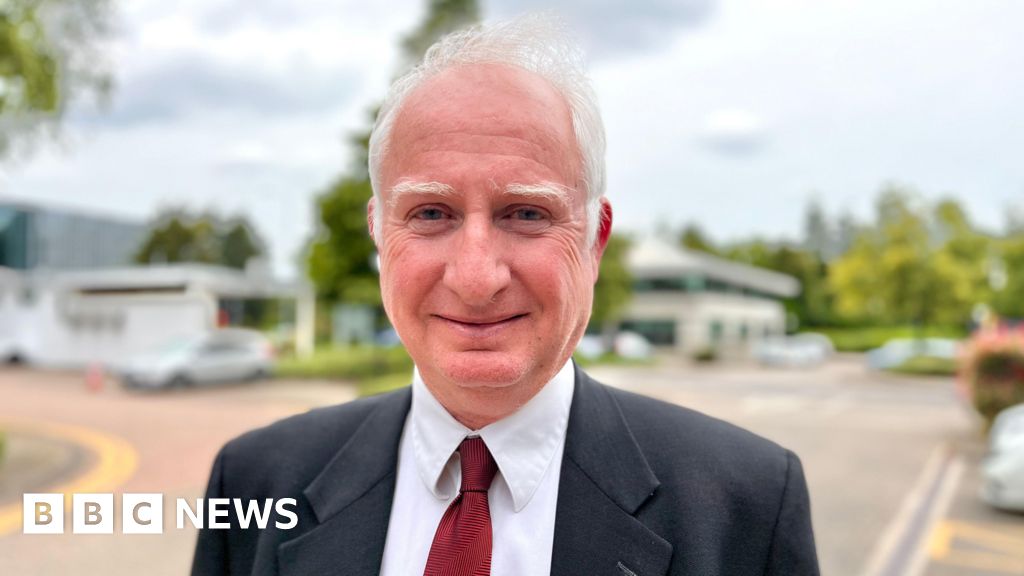ARTICLE AD BOX

Matt Hancock suggested ways the Tories could appeal to younger voters at a think tank event
By Joshua Nevett
BBC Politics
A damning assessment of the Conservative Party's electoral prospects has sobered the mood of the beer-sipping crowd gathered in a central London pub.
As spectators crowd into the venue, a former Conservative cabinet minister delivers a striking warning.
"We've got to embody the socially liberal, positive values that people under 50 overwhelmingly support," says Matt Hancock, the former health secretary turned reality TV personality.
"Because if we don't do that, then the Conservative Party will die."
He's addressing an audience of politicos at a packed-out event organised by Bright Blue, a think tank for liberal conservatism.
The subject of the talk: How can the Tories appeal to young people?
It's an existential question for the Conservatives, who have long struggled to attract younger voters. For MPs from the party, the data on voting intention highlights their thin support among younger generations.
A YouGov poll found only 21% of 18 to 24-year-olds said they voted Conservative at the last general election in 2019, compared to 67% in the over-70s category.
In recent polling, done at this month's local elections, only 8% of the 18 to 24 group said they would vote Conservative.
"For the 29 to 49-year-olds, that figure was 10%," Mr Hancock tells the event.
That 10% figure, Mr Hancock says, "is catastrophic for the electability of the Conservative Party, not just now, but for a decade".
"We need to have credible policies that address the issues that younger people care about," he says.
Dozens of people gathered at the Morpeth Arms to watch Mr Hancock speak
As a TikTok enthusiast with 184,000 followers on the platform, Mr Hancock claims to have an antenna for what young people are looking for in politics.
Curbing climate change, providing more affordable housing, and technological innovation are what young people care about - not some "divisive culture war", Mr Hancock says.
Even though he's been suspended as a Tory MP over his appearance on ITV's I'm a Celebrity, Mr Hancock is well received here.
But does his analysis really reflect the hopes and fears of younger generations?
Growing pains
At the event, we speak to five people under the age of 30, and tellingly, all of them say housing is their biggest worry.
Eve Redmond, a 23-year-old renter who recently moved to London, says: "I don't think I'll get on the property ladder in the next 10 to 15 years.
"I do think housing is a particularly important political issue for young people under the age of 30, millennials like me."
Joe Lynch, the 18-year-old chairman of Romford Young Conservatives, agrees.
"We need more affordable housing," he says. "If we can do that as a party, more young people can flock to us."
He says the creeping Americanisation of British politics has damaged the Conservative brand.
Some young people, he says, "think we're all Make American Great Again lunatics, but that's not the case at all".
Joe Lynch says the Americanisation of British politics has damaged the Conservative brand
The perception among young people of being "the nasty party" troubles Nathan Stone, 20.
He says the war against woke - a term that has come to symbolise conservative resistance to social changes - has been "taken to the extremes" lately.
He says some of the ideas expressed at this week's National Conservatism Conference - an event organised by a right-wing American think tank - are "not really going to appeal to younger people".
In his comments, Mr Hancock savages the "Conservative Corbynistas" in his party, who "preach the same sort of cancel culture and virtue signalling that they say that they abhor on the left".
"Looking at what's going on at other conferences, sometimes it felt like 'I'm a Conservative get me out of here'," he says.
With Mr Hancock standing down as an MP at the next election, he soon will be out of there. And yet, he still believes the liberal wing of his party has the answers to today's political questions.
Generational shift
They will need answers if they are to bridge the generational gulfs exposed at recent general elections. In 2017 and 2019 elections, as well as the EU referendum in 2016, age became the most prominent dividing line in British politics.
A report by the Onward think tank, from 2019, said 83% of Conservative voters were over 45, while 4% were under 24.
At the last election, the tipping point - the age at which people are more likely to vote Conservative than Labour - was 39, according to YouGov.
But recent data analysis suggests younger generations are upending one of the stickiest assumptions in politics.
In research this year, two political scientists from King's College London showed how millennials and Gen Z-ers are not becoming more Conservative as they age.
In analysis of Conservative support by age, the research showed a 40% gap between oldest and youngest in 2020, compared with 10% in the early 1990s.
One important factor is how the life chances of a generation have been shaped by events, such as the financial crash in 2008, Brexit and the Covid-19 pandemic.
Image source, Getty Images
Image caption,Prime Minister Rishi Sunak has put five pledges - economic growth among them - at the heart of his Conservative pitch
Bobby Duffy, professor of public policy at King's, says decisions by recent Conservative governments have not supported young people, while the increasing focus on culture-war issues has polarised the generations.
"This generational divide looks like terrible news for future support for the Conservatives, as clearly older generations are dying out and being replaced by these younger generations," the professor says.
Still, there are reasons to view predictions of Conservative extinction through a sceptical lens.
"The Conservatives do face a real challenge, but it may be as much to do with the current offer from this version of conservatism than the underlying principles and values," Prof Duffy says. "Decline is not inevitable for the Tories, but to avoid it, they do need to change."
The Conservative Party did not wish to comment.
Michael Gove, the levelling up secretary, told the BBC it was important "not to think about the country in terms of young or old" and insisted the Tories had "great young talent", who appealed to voters of all ages.
While the Tories wait to test that proposition in a general election, their party is being pulled in different political directions after 13 years in power.
Meanwhile, Mr Hancock, apparently joking, turns to his pink tie for inspiration.
"I occasionally wear a tie," he says. "Today was the first time I put on a suit in two weeks, because I'm a normal person, now. I'm not a Conservative MP. It's just like, be normal, like the people who we represent. That's what we need to do."

 1 year ago
17
1 year ago
17








 English (US)
English (US)